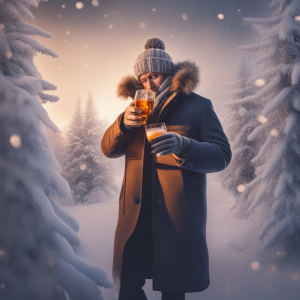Discover the Hidden Risks of Alcohol Consumption in Freezing Weather Conditions
As we navigate the harsh realities of winter, particularly in extremely cold climates, the instinct to seek warmth can dangerously lead to the habit of consuming alcohol. It is essential to understand the serious risks that come with this choice. This article aims to shed light on the substantial dangers associated with drinking alcohol in icy conditions, emphasizing why this practice is not only hazardous but also ineffective in maintaining body warmth. By enhancing your awareness of these dangers, you can make informed decisions that prioritize your safety and well-being throughout the treacherous winter months, ultimately improving your ability to survive and thrive in cold environments.
Before diving into the risks, it’s crucial to debunk the widespread myth that alcohol serves as a warming agent. When consumed, alcohol induces dilation of blood vessels close to the skin’s surface, which may create a misleading feeling of warmth. Although this sensation can seem comforting, it overlooks the vital need to maintain a stable internal body temperature. In reality, the effects of alcohol consumption can be detrimental, impairing your ability to withstand cold temperatures and significantly increasing the risk of severe health conditions such as hypothermia and other serious ailments. Understanding these effects can empower you to make safer choices.
 One of the primary dangers linked to consuming alcohol in frigid environments is the significantly increased risk of dehydration. Alcohol is well-known as a diuretic, meaning it promotes increased urine production, which can lead to substantial fluid loss. Furthermore, the cold air typical of winter conditions is drier, causing our bodies to lose moisture more rapidly. Combined, these factors can result in dangerously low hydration levels, which are critical for maintaining overall health and survival. Dehydration not only negatively impacts physical performance but also impairs cognitive functions, making it challenging to think clearly and make rational decisions during critical moments, which can be vital for safety.
One of the primary dangers linked to consuming alcohol in frigid environments is the significantly increased risk of dehydration. Alcohol is well-known as a diuretic, meaning it promotes increased urine production, which can lead to substantial fluid loss. Furthermore, the cold air typical of winter conditions is drier, causing our bodies to lose moisture more rapidly. Combined, these factors can result in dangerously low hydration levels, which are critical for maintaining overall health and survival. Dehydration not only negatively impacts physical performance but also impairs cognitive functions, making it challenging to think clearly and make rational decisions during critical moments, which can be vital for safety.
Understanding How Alcohol Consumption Affects Judgment and Awareness in Cold Weather
Another significant consequence of alcohol consumption is its ability to impair cognitive function and decision-making skills. In survival situations, making clear and rational choices is crucial for ensuring safety. The presence of alcohol can cloud judgment, creating increasing difficulty in responding appropriately to hazards. This diminished capacity for reasoning can lead to accidents and poor choices, which can have devastating effects when faced with extreme cold. Maintaining vigilance and awareness of your surroundings becomes essential; however, alcohol consumption undermines this necessity, raising the likelihood of errors that could jeopardize personal safety and lead to dire consequences in a frigid environment.
Moreover, alcohol disrupts the body’s natural temperature regulation mechanisms significantly. Upon consumption, alcohol causes blood vessels in the skin to expand, which results in increased heat loss. While this may create a temporary sensation of warmth, over time, it accelerates the loss of core body heat, which is essential for survival. This creates a dangerous cycle where the fleeting warmth leads to a rapid decline in core temperature, consequently heightening the risk of life-threatening conditions such as hypothermia. It is essential to realize that while alcohol may seem to provide quick relief from the cold, it ultimately increases susceptibility to severe cold-related health risks, making it a poor choice in freezing conditions.
Recognizing the Critical Connection Between Alcohol Consumption and Hypothermia Risk
When addressing the threat of hypothermia, it is vital to understand how alcohol consumption can obscure the early warning signs of this potentially life-threatening condition. Hypothermia occurs when the body’s core temperature drops below the normal range, generally below 95 degrees Fahrenheit (35 degrees Celsius). Symptoms can include shivering, confusion, fatigue, and impaired coordination. However, alcohol intake suppresses the body’s natural responses, making it increasingly difficult to recognize these critical indicators. By the time hypothermia symptoms become apparent, it may be too late to prevent serious injury or even life-threatening outcomes, highlighting the importance of avoiding alcohol in cold weather.
In winter survival scenarios, numerous safer and more effective alternatives to alcohol exist for maintaining warmth. Here are several strategies that can significantly enhance your ability to stay warm and safe amidst the cold:
1. Dress in Layers for Maximum Warmth: Wearing multiple layers of clothing is crucial for effectively trapping warm air. Start with thermal base layers to wick moisture away, add insulating mid-layers for warmth, and finish with a windproof and waterproof outer layer to create a protective barrier against the cold.
2. Ensure Your Clothing and Footwear Remain Dry: Moisture can lead to rapid heat loss, so it is vital to keep your clothing and footwear dry at all times. Opt for waterproof materials and change into dry garments whenever necessary to help maintain warmth and prevent hypothermia.
3. Insulate Yourself from the Cold Ground: Utilizing sleeping mats or insulation pads can significantly reduce heat loss, especially during rest periods. This step is essential for conserving body heat during extended exposure to cold conditions, enhancing overall comfort and safety.
4. Opt for Warm, Non-Alcoholic Beverages: Instead of opting for alcohol, consider hot drinks such as tea, coffee, or hot chocolate. These beverages provide warmth without the negative side effects associated with alcohol consumption, helping you stay alert and comfortable.
5. Seek or Construct Shelter for Protection Against the Elements: Actively searching for or building a shelter can greatly reduce exposure to harsh winds and freezing temperatures. A well-constructed shelter is vital for retaining body heat, significantly increasing your chances of staying warm and safe in extreme weather.
6. Fuel Your Body with High-Calorie, Nourishing Foods: Consuming nutrient-rich foods that are high in calories can provide your body with the energy needed to generate heat. Foods like nuts and fatty fish are excellent sources of healthy fats that are particularly beneficial in cold weather, supporting your body’s natural warmth generation.
Gaining a thorough understanding of the dangers associated with alcohol consumption in freezing temperatures is essential for anyone engaged in winter survival scenarios. Despite the temporary sensation of warmth that alcohol may provide, it can lead to dehydration, impaired judgment, disrupted temperature regulation, and can mask the symptoms of hypothermia. By consciously avoiding alcohol and adopting safe, effective strategies for warmth, we can significantly enhance our chances of surviving and thriving in extreme winter environments. Stay alert, prepare diligently, and prioritize your safety above all else to navigate winter successfully.
The post Hazards of Alcohol Consumption in Extreme Cold Conditions appeared first on Survival Bite.
The Article Alcohol Consumption Hazards in Extreme Cold Conditions Was Found On https://limitsofstrategy.com
The Article Alcohol Consumption Risks in Severe Cold Weather First Appeared ON
: https://ad4sc.com


This topic really resonates with me, as I’ve seen firsthand how misconceptions about alcohol can lead to risky behaviors, especially during winter. Growing up in a place with harsh winters, I often noticed people reaching for a drink to ‘stay warm,’ not realizing that it can actually have the opposite effect.
I completely understand what you’re saying. It’s interesting how our environments shape our perceptions and behaviors around things like alcohol. In winter, the cold can often lead people to seek immediate comfort, but that quick relief can be deceptive. I’ve noticed that, too — the allure of a warm drink can mask some really important realities about how our bodies respond to alcohol.
I can relate to that—it’s surprising how easily those misconceptions about alcohol creep in during the colder months; I recently came across some insights that really clarify those risks and might help others navigate those tricky winter choices.
‘Alcohol Consumption Risks During Extreme Cold Weather’
https://oldicom.net/alcohol-consumption-risks-during-extreme-cold-weather-2/.
It’s really interesting how the myth of alcohol as a warming agent persists, especially when so many of us tend to reach for a drink during those frigid winter nights. I remember a hiking trip last winter where our group debated whether a few swigs of whiskey would keep us warm. Thankfully, we opted for hot cocoa instead! It’s a perfect reminder that sometimes simple, wholesome choices can be more effective for our well-being.
I think it’s fascinating how myths like that can stick with us through generations. The idea of alcohol as a warming agent definitely has some deep cultural roots, but it’s interesting how misleading it can be. It’s great that your group chose hot cocoa instead; I can imagine it’s a lot more comforting on a cold hike.
Speaking of making wise choices, I recently came across some insights on rental car insurance—definitely a good read for anyone looking to stay covered without unnecessary extras.
‘Extra Collision Insurance: Do You Really Need It for Rentals?’
https://oldicom.net/extra-collision-insurance-do-you-really-need-it-for-rentals/.
You bring up a great point about the myths surrounding alcohol, especially in the context of winter and outdoor activities. It’s fascinating how ingrained these ideas can be, despite the scientific evidence suggesting otherwise. The notion that booze warms us up likely dates back centuries, rooted more in cultural practices and old wives’ tales than in physiology.
“Absolutely, making those simple choices can really enhance our experiences! If you’re looking for more wholesome winter drink ideas, check out this link for some warm and cozy recipes!”
https://oldicom.net/quillbot
This article brings to light an important yet often overlooked aspect of winter safety. I’ve witnessed firsthand how the temptation to enjoy a warm drink during the frigid months can cloud one’s judgment. In my own experience, I’ve seen friends underestimate the dangers of alcohol in these conditions, believing they are creating a false sense of warmth.
You bring up a crucial point about the allure of warm drinks in winter and how easily that enjoyment can obscure the risks of alcohol. It’s interesting how we often associate warmth with comfort, but that doesn’t always translate into safety, especially when it comes to the cold.
“I’m glad you shared your experience! To further explore safe practices for enjoying winter activities, check out this helpful guide.”
https://oldicom.net/quillbot
I really appreciate how you’ve highlighted the common misconception that alcohol can provide warmth in freezing weather. In my experience hiking during winter, I’ve seen friends reach for drinks believing it would help with the cold, but the reality is often the opposite. It’s fascinating how our bodies respond — while we may feel a temporary warmth, it can actually mask the chill we’re really experiencing.
It’s great to hear your experiences on the trail. That temporary warmth from alcohol can really trick us into thinking we’re secure against the cold, but it’s like a mirage—looks good until you get too close. I’ve seen folks make that mistake too. I remember one hike where someone sipped whiskey, feeling bold, while the rest of us bundled up tighter. The fact that alcohol dilates blood vessels, drawing blood to the surface, only makes it feel nice for a moment before your core temperature dips. It’s a tough lesson, but staying warm requires more than just a drink. Any tips you and your friends have picked up for staying warm on those winter hikes?
You bring up such a great point about the disconnect between how we feel when drinking and what’s actually happening inside our bodies. It’s really interesting that, during those cold hikes, the allure of a warm drink can sometimes overshadow the reality of how alcohol affects our circulation.
I appreciate your insights on the hidden risks of alcohol consumption in cold weather. This topic resonates with many of us, especially during the winter months when the urge to find comfort can lead us down a dangerous path. It’s interesting how societal norms often romanticize drinking as a means to keep warm, yet the reality is quite the opposite.